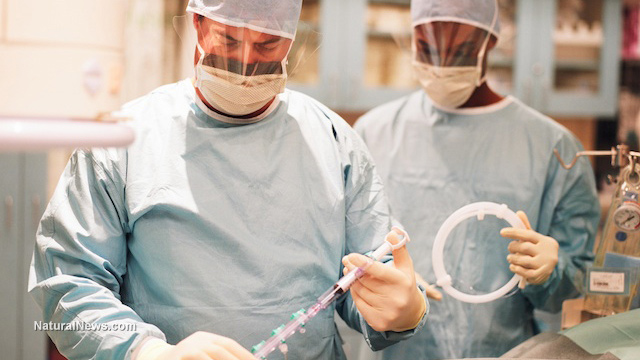Organs regrow themselves in clinical study
10/07/2016 / By usafeaturesmedia

(MindBodyScience.news) Helping the body to regrow damaged organs may sound like science fiction, but researchers in Switzerland say they’ve done just that.
The medical device company, Xeltis, is working with bioabsorbable materials. These materials act as scaffolding to help the body restore complex parts or organs using the patient’s own tissue. The porous structure of the scaffolding provides anchor points for healthy tissue to grow in a processes known as Endogenous Tissue Restoration. Once the healthy tissue is in place, the scaffolding is absorbed back into the body.
On Tuesday, researchers announced that they had successfully implanted bioabsorbable pulmonary heart valves into three children as part of their Xplore-I clinical feasibility study. Researchers are hopeful that the valves will grow and work as intended.
Results of an earlier clinical trial, announced Wednesday, give them reason for optimism. In that trial, bioabsorbable cardiovascular conduits implanted into patients were still functioning well two years after surgery.
That trial followed five patients aged 4 to 12 years at the time of surgery. The patients had only one functioning ventricle. The bioabsorbable conduits redirected blood to reduce stress on the heart, a common procedure in patients with congenital heart defects.
According to the Centers for Disease Control and Prevention, about 40,000 babies with heart defects are born in the United States each year. About 25 percent of those babies have a critical heart defect which will require surgery within the first year of life. Many will require multiple surgeries as they grow.
100% organic essential oil sets now available for your home and personal care, including Rosemary, Oregano, Eucalyptus, Tea Tree, Clary Sage and more, all 100% organic and laboratory tested for safety. A multitude of uses, from stress reduction to topical first aid. See the complete listing here, and help support this news site.
Dr. Alistair Philips, Co-Chair of the American College of Cardiology Surgeons’ section called, the technology exceptionally encouraging.
“Being able to develop a procedure and have a valve that’s going to grow with the child will be exceptionally valuable for those children,” Phillips said. “They won’t have to come back for a second procedure.”
The study is the first clinical trial in which the Xeltis bioabsorbable pulmonary valve has been implanted into patients. It is the first-ever cardiac valve made entirely of bioabsorbable polymers and the first to enable the heart to essentially repair itself.
“While Xeltis’ products get bioabsorbed in the body, they enable formation of new tissue that is expected to last longer than the existing products available today,” said Laura Monti Head of Communications at Xeltis.
Currently, doctors have two options when treating patients with congenital heart defects that require heart valve replacement. Either they use valves transplanted from organ donors, or they create a pulmonary conduit out of animal tissue.
“The problem with those valves is they will fail within five months to six years, and [patients] are going to have to come back,” Phillips said. “If there’s a valve that will grow with the child, that doesn’t have to be replaced, that’s the ideal.”
The Xplore-I trial will include as many as twelve patients aged 2 to 21 years old, Monti said. Those patients, along with the three who have already received the new implant, will be monitored over the course of five years to assess the functionality of the implant.
If the preclinical trial is a success, the device will move on to clinical trials. The US Food and Drug Administration has already granted Xeltis a Humanitarian Use Device Designation for the pulmonary valve.
The HUD designation is granted to medical devices that may help people with diseases affecting less than 4,000 individuals in the United States per year. Under this designation, the company only has to prove the safety of the product, they do not have to prove that it is effective. This enables companies to release a treatment even when it’s impossible to find enough patients to enroll in a clinical trial.
Phillips said that the technology presented by Xeltis may have an impact far beyond the treatment of congenital heart defects. Bioabsorbable implants may help repair heart valves in adults, build a new esophagus, or regrow skin for burn victims.
“It could be very beneficial to medicine as a whole,” Phillips said, “We’re going to see a lot more of this.”
More:
- Obesity Rates In The U.S., Overall, Are Falling, And That’s A Good Thing
- If You’re A Bookworm, You Just May Live Longer Than Others
- Some Antidepressants Can Increase A Rare Stroke Risk: Study
(c) 2016 USA Features Media.
Tagged Under: organs, regrowth, technology




















